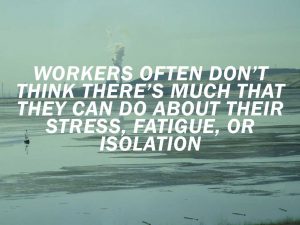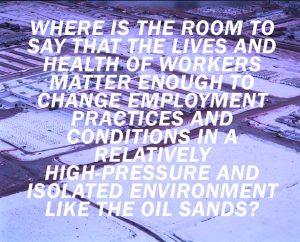 Sara Dorow is Professor and Chair of Sociology at the University of Alberta, where she teaches and conducts research in the areas of globalization, migration and mobility, and gender, family and work. She has been conducting research and publishing articles on the lived experiences of the oil sands political economy of northern Alberta for over a decade, and is also working on a book out of this research.
Sara Dorow is Professor and Chair of Sociology at the University of Alberta, where she teaches and conducts research in the areas of globalization, migration and mobility, and gender, family and work. She has been conducting research and publishing articles on the lived experiences of the oil sands political economy of northern Alberta for over a decade, and is also working on a book out of this research.
Hi Sara! Thank you for chatting with me today. You were recently featured in the documentary, “Digging in the Dirt.” Can you briefly tell me what the film was about?
It’s a film that is trying to get to the difficult issue of mental health impacts – and I would say physical health, too, because they’re related – of oil workers in Alberta. It does so by following a series of several trades workers through their own struggles with everything from depression to drugs within the pressures and experiences of oil sands work in particular. The filmmakers also interview several experts, such as researchers and psychologists.
How does this film fit into your broader research in Alberta?
Two of us who are interviewed in the film, Val O’Leary and myself, are working on a new research project on mobile work and mental health through a SSHRC Partnership Engage Grant. Val is a critical incident stress management intervener so she’s called out when there are incidents at oil sands sites, whether it be an accident or death. We’re studying mobile work, or in this case, fly-in fly-out (FIFO), or drive-in drive-out work, in relation to mental health.
The research had its start with the OTM project, where I looked more broadly at experiences of FIFO oil sands workers who stay in camp. Based on that research, and on Val’s years of practical experience, we are now focusing more specifically on their mental health and the potential impacts of their work conditions on wellbeing. We’re doing 100 in-person (including by phone or video chat) surveys with FIFO mobile workers who stay in camp, and a series of more in-depth interviews. Out of this project we hope to have one of the very first studies in Canada that is specifically looking at mental health among FIFO workers. The survey is a combination of closed-ended and open-ended question, i.e., a mix of quantitative and qualitative data.
Do you have any preliminary results that you would like to share?

We have had a really good response to our call for participants, and have just reached the halfway mark of 50 surveys completed. They represent age and gender diversity, and come from a variety of trades; so far, most are working for contractors. Although we have a ways to go with the project, I can say at this point that certain themes are coming to the fore. They’re related to the film in the sense that the film highlights a masculinist, macho culture, where you suck it up and keep working despite the things that might be bringing you down or stressing you out. That’s certainly coming up in our surveys, but we’re also learning things that help to extend or nuance this insight.
One is how this differently impacts workers. For example, the kinds of things that women face as mobile workers who are gone for weeks at a time, and stay in camp, can be quite distinct. These range from the stress of trying to keep up in vitro fertilization treatments to trying to get a crew of men to listen to you.
Besides gender differences, I think age and generation will be something we have to further tease out, and certainly also experiences of supervisors vs people who are ‘on the tools’. We’re finding, for example, that supervisors are often feeling squeezed as they work between pressures from management and the stresses and safety of their crews. We’ll also want to look at different kinds of work situations, e.g. the ‘regular’ FIFO rotational workers next to people who work shutdown (6-8 weeks of intensive maintenance, usually a couple of times a year).
A few things are emerging that are disturbing. These aren’t necessarily issues that affect all workers, and they vary by employment context, but they are common enough across participants to be noted.

One is that the workers often don’t think there’s much that can do about their stress, fatigue, or isolation. The pressure to get work done so that costs can be kept down and production up, the pressures of being away from family, and the financial stressors of wondering if you can keep up what you’ve started in terms of house payments or getting a kid through college–all of those things add up and compound stress and mental health. But people mostly feel like there is nothing that can be done about it, that it “comes with the job.” Some workers feel buffered by unions or maybe by a good supervisor or work crew, but they are also discouraged that in a continued downturn, unions have to re-negotiate contracts, and supervisors and crewmates have a harder time keeping up morale.
Secondly, and what I anticipate will be one of the key issues coming out of this project, are reports of a culture where workers fear that if they report health issues—and especially mental health issues—they might get laid off or not called back for a later job. So there’s not only a culture of “you’re supposed to suck it up and deal with it”, but also a culture of mistrust around seeking information or help. Some workers indicate that this has worsened with the downturn, where they get a stronger sense that workers are expendable.
Another key finding is going to be around camp and the difficulties of living in camp – isolation, loneliness, negativity that spills over from work and/or family. I should also note that it goes in the other direction: work stress and distance also spill over into family. Depending on the camp, there are also challenges with quality of beds, shared washrooms, recreational facilities, and food. This gets tougher if, for example, a person has dietary needs related to a health issue. We’ve talked to people for whom this becomes both a physical and a mental health issue, because they’re stressed about their physical health deteriorating as a result of being stuck with camp food.
Participants tell us that rotations, schedules, and camp conditions can make a real difference to their mental health, and yet, workers have almost zero say over any of that. So, one of the key questions coming out of the study will be if and how employers in the industry are willing to bend to alleviate impacts on workers. Workers seem to be absorbing many of the social and health costs of the time and money pressures of oil sands development. Some find it a constant struggle, others get defeated by it, and others report having “programmed” themselves to get through it.
One participant relayed a story about a worker who, after an intensive eight weeks of working a shutdown, was dog tired and asking to go home, but ended up capitulating to his employer’s request to stay on for two more weeks. He finally got home, only to have a fatal heart attack. You can’t necessarily assume a direct causal correlation, of course, but it’s that kind of story that really brings it home. Where is the room to say that the lives and health of workers matter enough to change employment practices and conditions in a relatively high-pressure and isolated environment like the oil sands?

Watch “Digging in the Dirt” on CBC Gem here.
To read more of Sara’s research on Fort McMurray, check out her recent publications:
Dorow, S., & Mandizadza, S. (2018). Gendered circuits of care in the mobility regime of Alberta’s oil sands. Gender, Place & Culture, 25(8), 1241–1256. https://doi.org/10.1080/0966369X.2018.1425287
Dorow, S., & O’Shaughnessy, S. (2013). Fort McMurray, Wood Buffalo, and the oil/tar sands: Revisiting the sociology of community. Canadian Journal of Sociology, 38(2), 121–140.


One Response to Digging in the Oil Sands: On the Move with Sara Dorow
Pingback: On the Move Partnership | The Lonely Man: Mental Health & Trades Workers